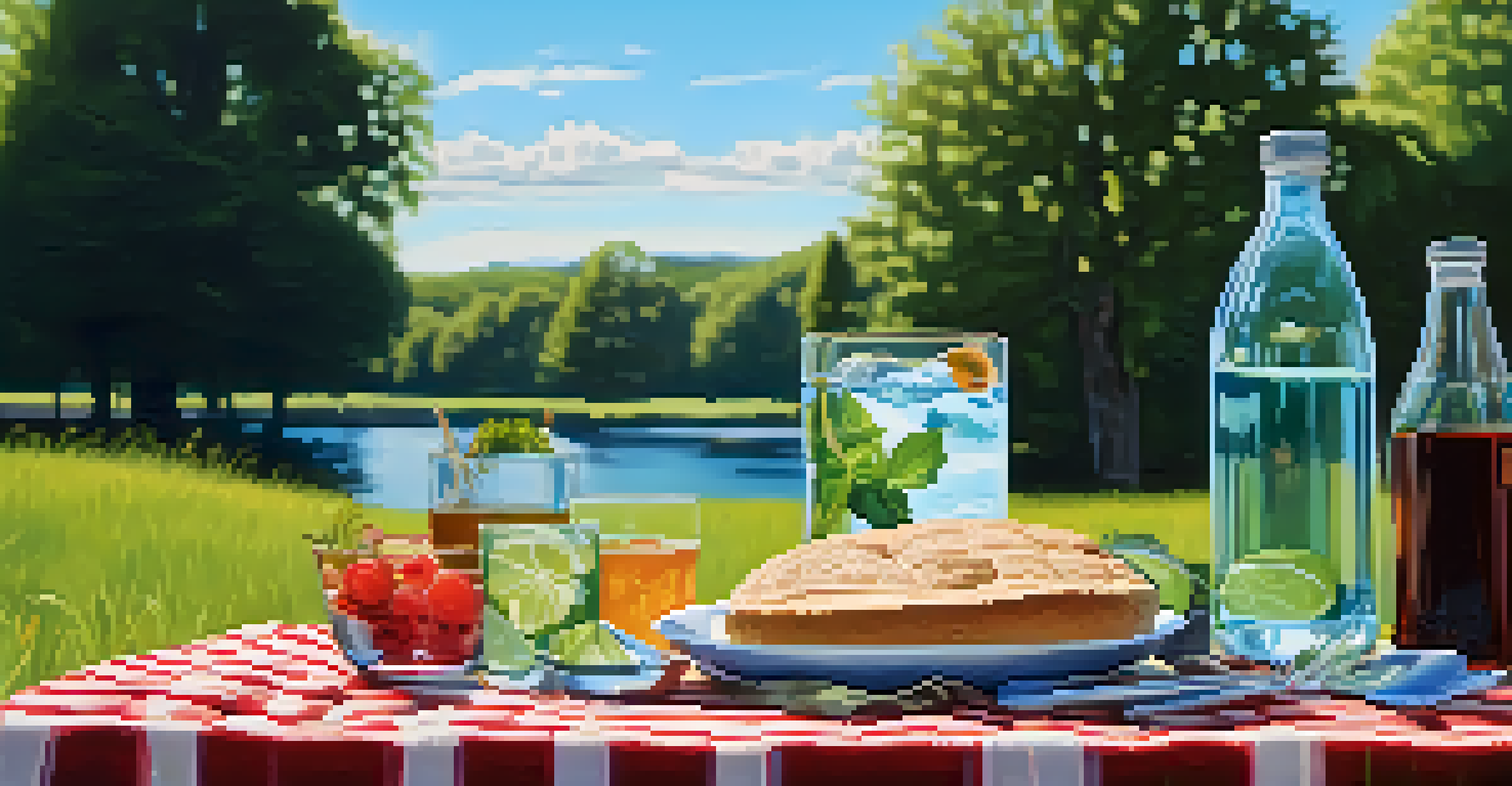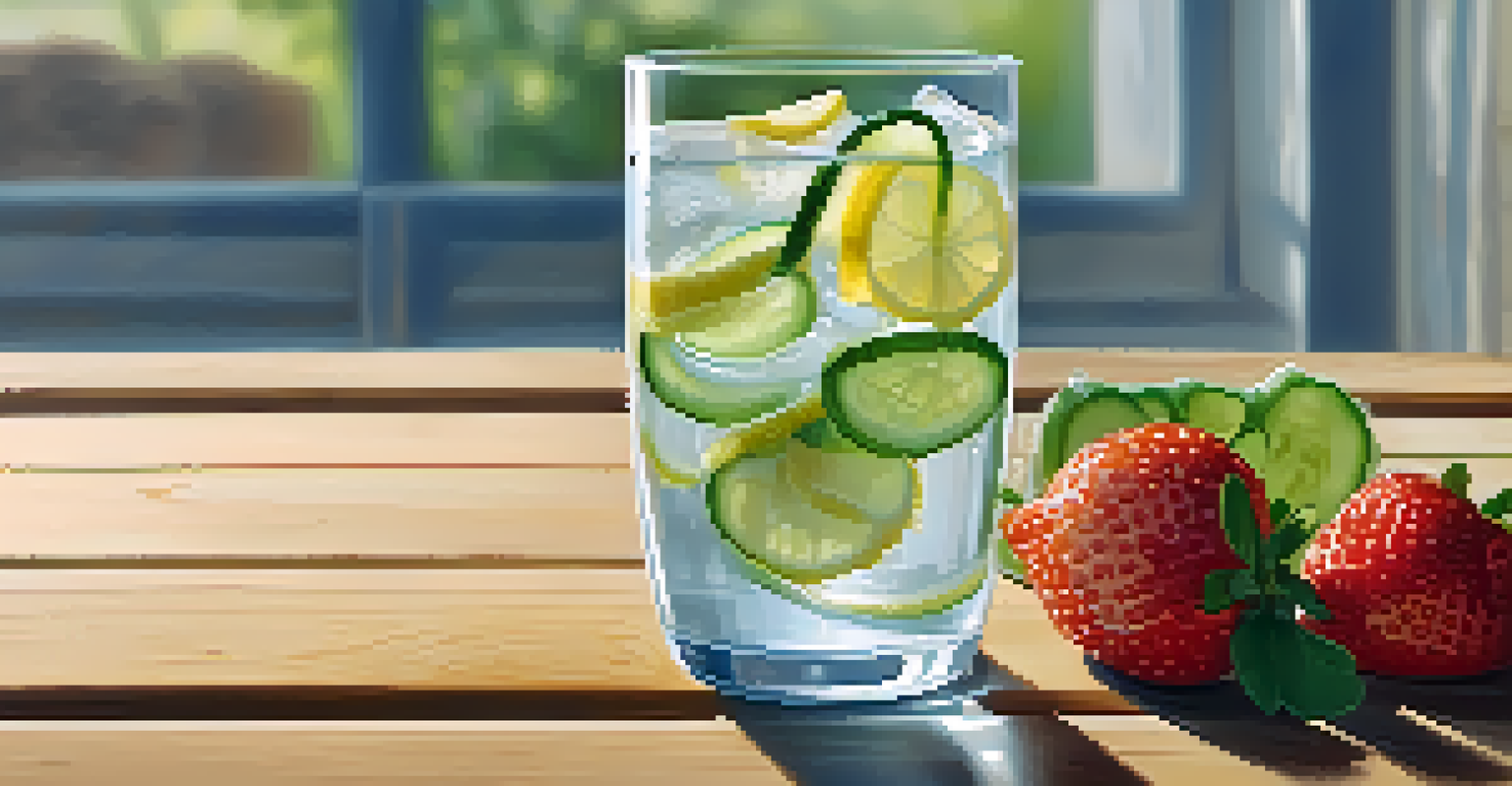Hydration Myths: Debunking Common Misconceptions in Naturopathy

Myth 1: You Must Drink Eight Glasses of Water Daily
Many people believe that drinking eight glasses of water daily is essential for good health. However, this 'one-size-fits-all' approach doesn't take into account individual needs based on factors like age, activity level, and climate. For instance, someone exercising in a hot environment may need more hydration than someone working indoors.
Water is the source of life, and to be properly hydrated is to be truly alive.
It's important to listen to your body. Thirst is a natural signal that indicates when you need to hydrate. Instead of fixating on a specific number, focus on drinking enough water to quench your thirst and maintain clear urine, which is a sign of proper hydration.
Incorporating water-rich foods like fruits and vegetables into your diet can also contribute to your hydration needs. So, rather than counting glasses, think of hydration as a holistic approach that includes various sources.
Myth 2: All Beverages Hydrate Equally
Another common misconception is that all beverages hydrate you the same way. While it's true that liquids contribute to hydration, not all drinks are created equal. For example, caffeinated beverages like coffee and tea can have a mild diuretic effect, leading to increased urination.

Alcohol is another culprit; it can dehydrate you by inhibiting the production of the hormone vasopressin, which helps your body retain water. So, while a cocktail or soda might quench your thirst temporarily, it's not necessarily doing your body any good in terms of hydration.
Hydration Needs Vary by Individual
Everyone's hydration needs differ based on factors like age, activity level, and environment, so it's best to listen to your body rather than follow a one-size-fits-all rule.
Opting for water or herbal teas can be a better choice for hydration. Remember, the goal is to choose beverages that actively support your hydration, rather than hinder it.
Myth 3: Thirst is a Sign of Dehydration
Many people assume that feeling thirsty means they are already dehydrated. While thirst is indeed a signal from your body, it doesn't always indicate a critical need for water. In fact, it can be a normal response to a variety of factors, including diet and physical activity.
Hydration is essential to health and wellness. It should not be an afterthought but a priority.
The body has a complex system that regulates hydration, and thirst is just one part of it. For instance, some people may not feel thirsty even when they need more fluids, especially older adults whose thirst mechanisms may not function as well.
Instead of waiting for thirst to kick in, make it a habit to drink water regularly throughout the day. This proactive approach can help you maintain optimal hydration without relying solely on thirst as a guide.
Myth 4: Only Water Counts Towards Hydration
It's a common belief that only plain water contributes to hydration, but this isn't entirely true. Many foods, especially fruits and vegetables, have high water content and can significantly contribute to your overall hydration levels. For example, cucumbers and watermelon are over 90% water.
Broths, soups, and even smoothies can also aid in hydration. They not only provide fluids but can also deliver essential nutrients, making them a great addition to your diet.
Not All Beverages Hydrate Equally
While liquids contribute to hydration, some beverages, like caffeinated drinks and alcohol, may actually hinder hydration efforts.
So, while drinking water is crucial, remember that hydration can come from a variety of sources. Embrace a diverse range of hydrating foods and drinks to keep your body well-hydrated.
Myth 5: Hydration is Only Important During Exercise
Many people think that hydration is only crucial when they're exercising, but this is a misconception. Staying hydrated is vital for overall health, whether you're working out or simply going about your daily activities. Dehydration can affect your mood, energy levels, and even cognitive function.
Even mild dehydration can lead to fatigue and irritability, making it difficult to focus or engage fully in your day-to-day tasks. Hence, it's important to prioritize hydration throughout the day, not just during workouts.
Make it a routine to sip water regularly, especially if you live in a hot climate or have a busy lifestyle. Your body will thank you for it!
Myth 6: Clear Urine Means You're Fully Hydrated
While clear urine often indicates good hydration, it's not the only measure to consider. Some individuals naturally have pale urine due to factors like diet or certain medications, while others may have darker urine even when adequately hydrated. This can depend on various factors, including how much water you've consumed and your overall health.
It's essential to consider other signs of hydration as well, such as your energy levels, skin elasticity, and overall well-being. If you feel good and your body is functioning well, you’re likely maintaining healthy hydration.
Hydration is an All-Day Commitment
Staying hydrated is important throughout the day, not just during exercise, as dehydration can negatively impact your mood and energy levels.
Instead of solely focusing on urine color, adopt a more holistic view of your hydration status. Pay attention to how you feel and adjust your fluid intake accordingly.
Myth 7: Drinking Water Before Meals is Bad
Some people believe that drinking water before meals can hinder digestion, but this isn't necessarily true. In fact, drinking water can actually aid digestion by helping to break down food more efficiently. It also prevents overeating, as it can create a feeling of fullness.
However, it's important to strike a balance. Drinking excessive amounts of water right before a meal might make some feel uncomfortable, but a moderate amount can enhance your dining experience.

So, don’t shy away from a glass of water before your meals. Instead, embrace it as part of a healthy eating routine that supports good digestion.
Myth 8: You Can Overhydrate
While hydration is crucial, some people worry about the concept of overhydration, or water intoxication. This condition is rare and typically occurs in extreme circumstances, such as endurance sports or excessive water consumption in a short time frame. Most people don't need to worry about this unless they're consuming far beyond their body's needs.
In general, the body has a remarkable ability to regulate water balance. If you do happen to drink too much, your kidneys will work to expel the excess fluid, making it unlikely for the average person to experience overhydration.
It's always best to listen to your body and drink in moderation. Focus on maintaining a healthy balance, and remember that hydration is essential for well-being.